MercoPress. South Atlantic News Agency
Tag: Olimpic Games 2016
-
Wednesday, November 23rd 2011 - 04:23 UTC
“Las Malvinas son argentines” crest for the Argentine Olympic team uniform

A draft bill signed by fourteen Argentine lawmakers from the political spectrum calls for all national teams to include in their uniforms the crest of the Islands and the motto “Las Islas Malvinas son argentinas” (The Malvinas islands are Argentine).The sponsors want the bill approved on time for the inauguration of the Olympic Games next year in London.
-
Thursday, November 10th 2011 - 06:01 UTC
War zone in Rio as police prepares to take control of the city’s biggest favela
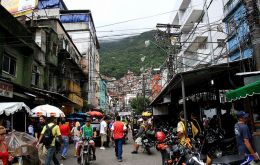
Brazilian police made two key arrests Wednesday in Rio de Janeiro's biggest favela (slum) as they ready to take control of the area from drug traffickers, in anticipation of the 2014 World Cup and 2016 Olympic Games.
-
Friday, October 28th 2011 - 04:45 UTC
Dilma respects cabinet sharing: names another Communist new Sports minister
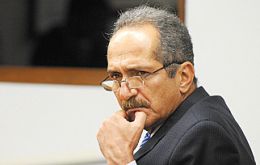
Brazilian president Dilma Rousseff appointed a Communist Party congressman as the country's new Sports minister Thursday, replacing Orlando Silva, an official from the same party who resigned as he fights corruption allegations.
-
Monday, October 3rd 2011 - 07:22 UTC
Rousseff and Blatter to discuss disputes regarding organization of 2014 World Cup
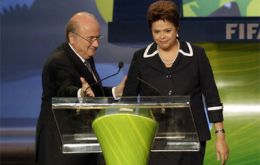
Brazilian President Dilma Rousseff plans to meet the president of soccer's world governing body on Monday to resolve a legal dispute over the 2014 World Cup, the Estado de S. Paulo newspaper reported.
-
Thursday, September 8th 2011 - 00:52 UTC
Brazilian forces try to regain control of shanty town again lost to criminal gangs
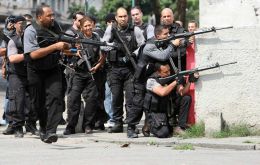
As Brazilians celebrate Wednesday September 7, Independence Day – a national holiday – Brazilian forces are engaged in trying to regain control of one of Brazil’s largest favelas.
-
Tuesday, September 6th 2011 - 22:12 UTC
Emirates airline to open daily non-stop service Bangkok/Rio do Janeiro/Buenos Aires
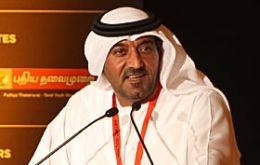
Two of South America’s most iconic cities will soon have a faster link to Bangkok when Emirates commences its daily non-stop service to Rio de Janeiro and extension to Buenos Aires from 3rd January 2012.
-
Wednesday, July 20th 2011 - 11:22 UTC
Ahead of major international events, Brazil Tourism Board names new president

The Brazil Tourism Board (Embratur) named Flavio Dino, a former federal congressman, as its new president, succeeding Mário Moysés.
-
Tuesday, July 12th 2011 - 21:01 UTC
Brazil’s 2016 Olympics deadline running faster that the high-speed train project

Brazil's ambitious high-speed train project was postponed once again due to a lack of bidders but Brazilian officials anticipated they would hold two separate bids for the project to link Rio de Janeiro and Sao Paulo on time for the 2016 Olympic Games.
-
Friday, May 20th 2011 - 19:29 UTC
Brazil’s Golden Age–or Parade of White Elephants?

by COHA Research Associate Augustus Urschel.
The 2014 World Cup and 2016 Olympics.
Winning the 2014 World Cup and 2016 Summer Olympic bids continues to have both intended and unexpected consequences for this year’s miracle country. On November 28, 2010, Brazilian police and soldiers seized the Complexo do Alemão, a large favela in the Northern Zone of Rio, from drug lords. -
Friday, February 25th 2011 - 06:29 UTC
Half a million Brazilians murdered between 1998 and 2008

Brazil is the sixth most murderous country in a list of 100 nations around the world, according to a new study sponsored by the government and released Thursday.
